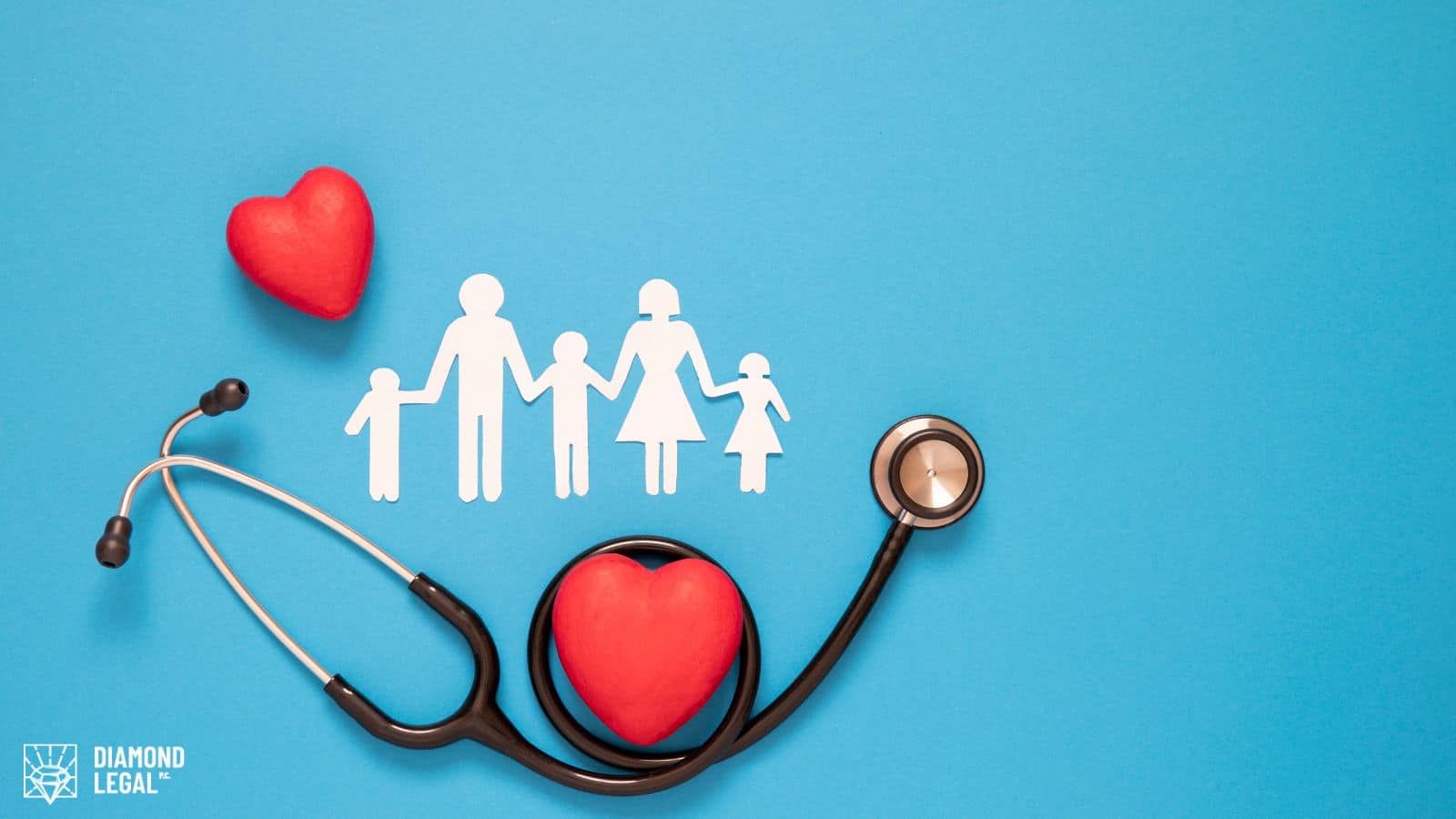If I Get a Divorce, Who Pays the Health Insurance?
When a couple decides to get a divorce, there are a lot of questions that need to be answered. One of the most important is who is responsible for paying for health insurance.
Health insurance is a major issue today. Sometimes there aren’t any simple answers. Whether both parties do not have their own health insurance or parties are both covered with Medicare, health insurance is an issue you must address in all divorces.
We know how stressful and confusing going through legal battles can be. That’s why our McHenry, Illinois attorneys at Diamond Legal are here to help.
Let’s dive in and cover the basics of what you need to know when it comes to your health insurance during and after a divorce.
Can I be removed from a health insurance policy before a divorce is finalized in Illinois?
Being removed from a health insurance policy in the middle of a divorce is not allowed in Illinois. Many times when a couple is going through a divorce, the two may be living in separate living conditions which poses the question of whether a policy can be broken before the divorce is finalized.
This isn’t allowed for numerous reasons:
- Insurance policies don’t allow a person to be removed in the middle of a plan or policy year. The insurance companies only update their records once a year.
- Insurance companies don’t see a current divorce as a “change of circumstance.” Until the insurance sees a divorce decree, nothing has changed in their eyes. They still see you both as married.
- If your ex-spouse has current medical expenses, past-due payments, or has defaulted on any payments, you’re still a verified point of contact and responsible for any bills on that policy.
If I get a divorce in Illinois, who pays the health insurance?
Once the divorce is finalized, it’s quite common to ask the question of “Who takes care of the health insurance?”
In most cases, the person who is responsible for paying for the health insurance is the one who is responsible for paying the bills. This means that if you are the one who is paying for the health insurance, you will need to make sure that your ex-spouse is taken off of the plan.
If you are not paying for the health insurance, your ex-spouse will need to take you off if they no longer want you on their same plan.
If you get divorced and currently have good coverage, that’s great! In many situations, one’s coverage can be continued for a period of time – although the cost may be exorbitant.
If you don’t have coverage, though, that could be a major problem. In other situations, you most likely will need to find a new health insurance plan. This is something you must determine ahead of time (what health insurance is available for you and how much it will cost, etc.).
In addition to finding a new health insurance plan, federal law states that even after a divorce has been finalized, you’re still eligible to apply for health insurance coverage through your spouse’s plan.
You’ll have at most 60 days after your divorce to contact the health insurance plan administrator and plan coverage. This federal law is called the “Consolidated Omnibus Budget Reconciliation Act of 1985” (COBRA.)
Who covers the health insurance of the children?
If you have children, as you know health insurance needs to be continued for them. In some cases, the party with the best coverage would either be ordered to or, by agreement, continue the health coverage for dependent children.
The additional costs to cover the children is frequently divided between the parties. Either way, providing health insurance for children and allocation of costs for the children is something that needs to be addressed in all divorces with dependent children.
A dedicated McHenry divorce attorney can help you address this question and determine the best solution.
What to do if you can’t afford to pay for your child’s health insurance in Illinois?
If you can’t afford to pay for your child’s health insurance, there are a few things that you can do in Illinois to try and get help. One option is to apply for Medicaid or Children’s Health Insurance Program (CHIP.)
These programs provide free or low-cost health insurance to Illinois citizens who meet certain requirements. You can also try to find a health care plan that is affordable for your budget. There are many plans in Illinois that are available that offer low premiums and no-cost preventive care.
Finally, you can talk to your child’s doctor about finding a payment plan that works for you.
How to make the health insurance transition easier for everyone involved
Making the health insurance transition easier for everyone involved usually means taking a few key steps.
First, be sure to update your insurance information with your employer, and make sure that your ex-spouse does the same. Next, if you have children, be sure to add them to your insurance plan.
If you’re not sure what to do after your divorce, Diamond Legal can help.
Contact an Illinois divorce attorney today
We know how stressful the divorce process can be. If you are going through a divorce, contact Diamond Legal for representation from an experienced Illinois divorce attorney.
Our McHenry attorneys will help guide you through the entire legal process while keeping your best interests at heart.
If you are unsure about what steps to take for health insurance after a divorce, give us a call. We’ve got your back!
DISCLAIMER: Any information contained herein is solely for informational purposes. While it is important that you educate yourself, nothing herein should be construed as legal advice or create an attorney-client relationship. For specific questions, we urge you to contact a local attorney for advice pertaining to your specific legal needs.
More Posts We Think You’ll Like

5 Common Mistakes in DIY Divorces and How to Avoid Them
The percentages are different in various states, but estimates show that approximately 35-45% of all divorces filed today are filed pro se, or on your own. (Pro se is a Latin term meaning “for one’s self” or “on one’s own”.) This trend is on the rise – in some counties, a majority of divorce cases has at least one party who chooses to represent themselves.
This trend is understandable, especially during a downturn in the economy. Before making this choice, however, you should be aware of the pros and cons of filing on your own as well as common mistakes that can cost you a lot of time and money and how to avoid them.

Uncontested Divorce: Do You Really Need a Lawyer?
Our team talks with people every day who are either considering filing for divorce or going through one. Many people…

DIY Divorce in Illinois: The Pros and Cons of Filing Pro Se
More and more people today are choosing to take advantage of “DIY” or pro se divorce in Illinois; while this…

